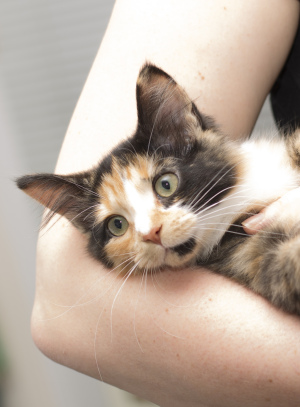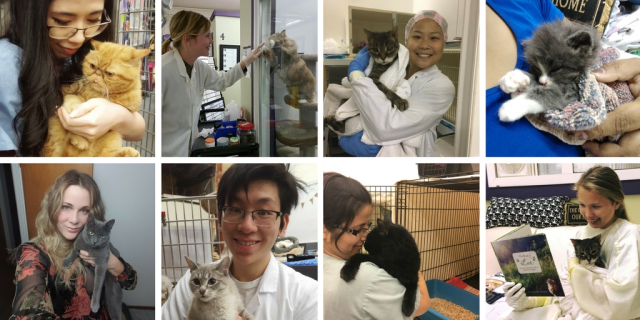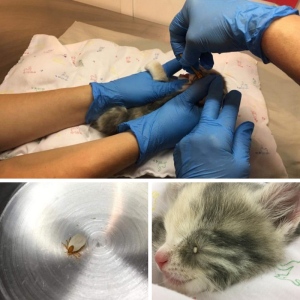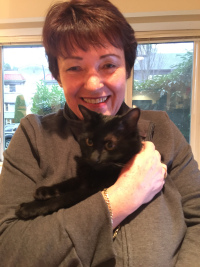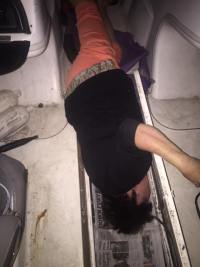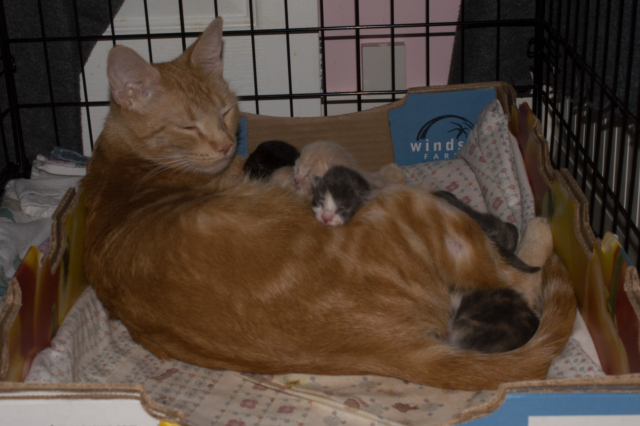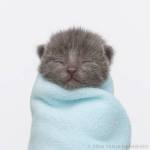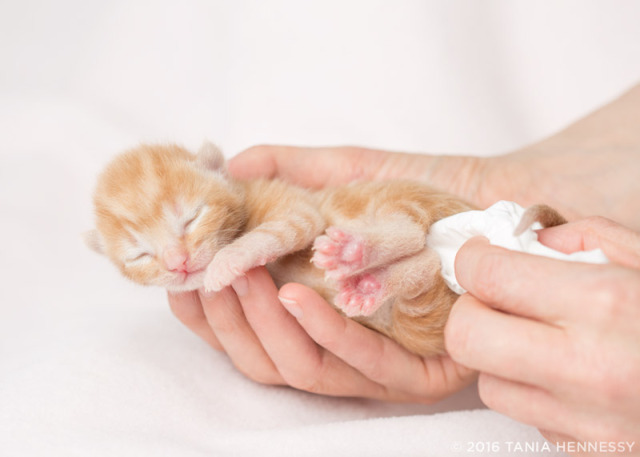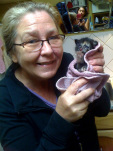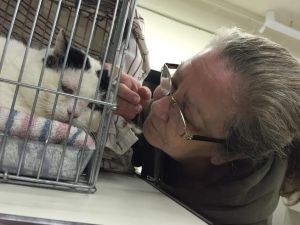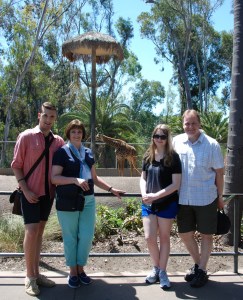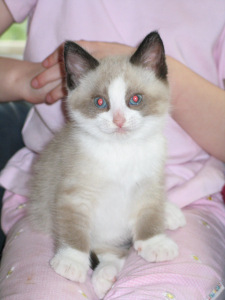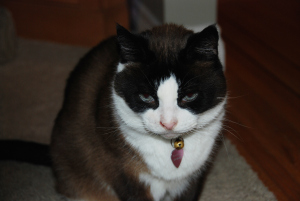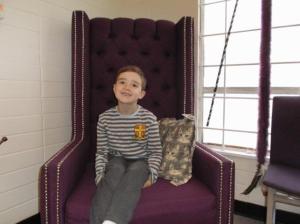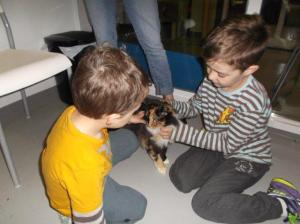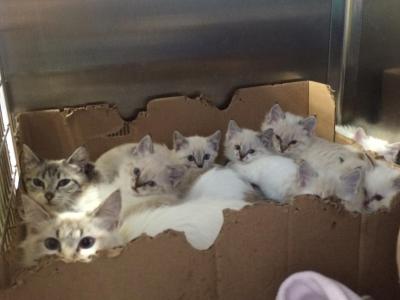
This bunch of semi-feral kittens needed lots of socialization before they were ready for adoption.
Cats and kittens are ready for adoption when they learn to trust and accept us humans. As many of the cats in our care come from the streets they’ve often had limited or negative experiences with people. By caring for them in a stable and safe home environment, our foster moms and dads are helping to charge their view of humans, which is life changing. Fostering allows these cats and kittens to grow and transform into confident kitties who will then find their forever homes.
As each cat or kitten is unique, the way foster parents socialize with them is different. For example, feral or semi-feral kitties see humans as potential predators and so they’ll run away and hide. They may hiss at you when you try to pet them or lash out by swatting or biting. In this situation the caregiver must be slow and patient. You start by sitting wherever they are – close but not too close – and make sure you have some tasty treats. As you have food, they’ll start to associate you with good things. The more they see you as non threatening, the more they’ll warm up to you. Eventually, with patience, love and persistence, an adoptable kitty emerges.
Fostering’s not only a positive experience for the kitties, but also the foster parents! It’s very rewarding to help cats and kittens get adopted. A little time and patience goes a very long way and watching them grow and learn to accept and love humans is an extraordinary feeling. Foster parents not only have immense love for kitties, but also the desire to put time and effort into giving them the best life possible. Unconditional love is given to each cat and that love changes their lives for the better.
Erin, a long time foster parent, shares a memorable story:
“My very first foster turned into my very first foster fail! I took her on while living in Australia. I had some extra time on my hands, so I asked the vet clinic close by if they had a sick or higher-needs cat that needed fostering. They were so happy since they just had a feral kitten brought in. She was extremely hissy and completely terrified of humans, so they needed her to go somewhere else aside from the vet clinic. I brought her home and got her settled into the bathroom. After hiding under the sink in the bathroom for the entire first afternoon through to the night, the next day I went in there to stay with her and do my own thing while being with her. After doing that for the morning, she came out from under the sink, crawled up on my lap, had a bath, curled up on my lap and went to sleep. I knew at that moment that I would not be giving her back at all, ever. The rest is history!
She is very much attached to me (and only me) and not great with other animals. But because of my experience with her we’ve gone on to foster 26 more kittens since then. She was my introduction into fostering and paved the way for all these other kittens to come and be a part of my life. I’m grateful for every day that we have together! And seeing how she has grown from an incredibly hissy and terrified kitten to a much more confident and happy cat, has shown me just what fostering can do for a cat. It is a life changer for them!”
Sarah, a long-term VOKRA foster parent, has fostered two “pee kitties” so far. These are kitties who pee in inappropriate places for seemingly unknown reasons. After checking with a vet to make sure there are no underlying medical issues, she goes through all the other potential reasons, such as stress and anxiety, disapproval of the little box shape or litter type, habits or any other thing she can think of. She notes all the occurrences of inappropriate peeing and the surrounding circumstances to find the patterns and modify the environment as needed. She’s just like a detective!
With one foster, all the kitty required was a larger box with deeper litter. With the other kitty, Zoey, all she needed was to have all enticing soft items, such as towels and bath mats, off the floor so the only target for pee was the litter box. All these “pee kitties” simply needed was a person with the patience to understand what they want and the willingness to create a consistent environment for them.
Sarah weighs in on why being a foster parent is an amazing opportunity:
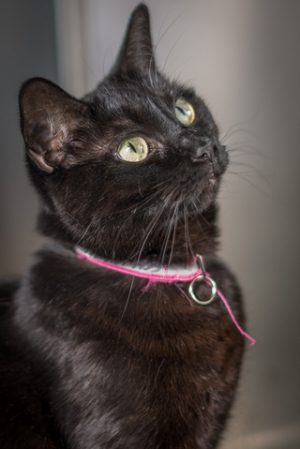
Ziggy’s one of Sarah’s former “pee kitties”. Happily she was recently adopted and now has a new forever home.
“I started fostering when I was living on my own after having moved to Vancouver by myself. I grew up with cats and adding a cat to my home seemed like a no brainer! However, as a student, I was unsure about my long-term plans so fostering allowed me to have a furry companion without committing before I was ready. It’s also so rewarding to see them improve and go off to new homes with excited new owners! And, of course, I feel like I’m helping with the larger problem of cat overpopulation and reducing strain on VOKRA as a rescue organization so that their main focus can be on those cats with greater medical needs while healthy kitties can enjoy the comfort of a home rather than a shelter environment. It also allows me to help teach others about the importance of fostering and how much fun it is!”
Fostering saves lives and we have more than 350 foster parents to thank for that! Many of our kitties need to socialize with humans and learn to accept them before being adopted and our foster homes offer the best opportunity for them get the fresh start they need. One at a time, fostering produces a transformed, adoptable kitty ready to find a loving furever home!
At VOKRA we’re always looking for new foster parents to help save more lives. We provide all the food, supplies and other equipment necessary to our foster homes, as well as ongoing support and advice. You simply provide the care, attention and love.
We have a variety of fostering situations as we take in orphaned kittens, feral kittens, pregnant mothers, mothers with kittens and adult cats. Each year we need temporary homes for more than 1,400 kittens and cats! If you’re interested in learning more about fostering, please visit our website at vokra.ca/fostering.
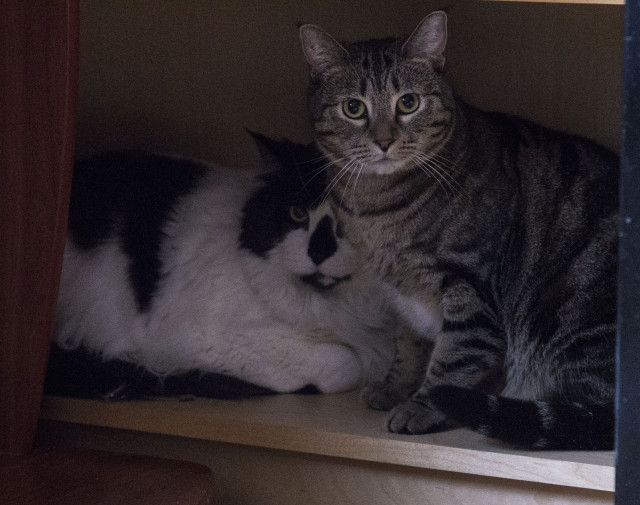
Raindrop and Steveston each grew up in difficult circumstances and came to us as semi-feral cats two years ago. They met in foster care where they became fast friends and are a great comfort to each other. They’re both still very shy, but we’re hoping an accepting and patient adopter will come along and open their heart and home to them.
The primary goal of the Medical Team is to improve the overall health of all the cats temporarily staying at our Operations Center – basically to ensure they’re healthy, fed and have a clean environment to live in. The team provides them with medical care and treatments, as well as environmental and social enrichment during their shifts. At the Operations Center we also work very closely with our Cat Care friends whenever a cat requires monitoring. This includes monitoring overall health, cold symptoms, appetite, bowel movements and urine output. In exchange for the help the Cat Care Team provides, the Medical Team also provides assistance to their associates by offering their hands to treating and feeding the more feral cats while assessing and monitoring their behaviours as well.
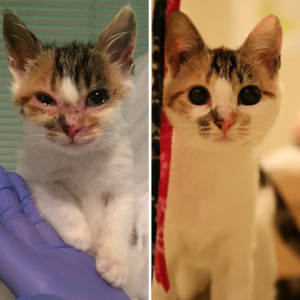
Ringworm + a cold makes for a tricky combination. But after lots of care and attention Cadbury is now healthy and in her forever home.
Besides monitoring, some of the treatments the Med Team provides include administering oral and topical medications, intramuscular and subcutaneous injections, routine vaccinations, deworming and deflea treatments. Particular infectious cases, such as colds and ringworm, require extra care so the team undertakes extra measures to prevent transmission to healthy cats. This includes gowning up and strict disinfection protocols around the clock. This past year at VOKRA was particularly challenging for the Medical Team as they had a few outbreaks of ringworm (which is a persistent skin fungus). Due to the teams diligence in administering oral medications in conjunction with topical creams and medicated baths, we’re happy to say they successfully treated 22 cases of ringworm in 2017.
Also, we have a few members of the Med Team who are involved with the Management Team. These lovely people assist in many ways, including scheduling, conflict management, error checking medical records, updating health records, organizing and strategizing new treatment plans, researching and writing new operating protocols, and the list goes on. With such large tasks at hand during regular medical shifts, this small cohort of people work together to make things more manageable, largely by creating a less stressful environment to work in.
Overall, they work as a team to improve the overall health of all cats by providing them with the medical care and treatments they need for placement into foster homes. From bottle-feeders to geriatrics, and semi-ferals to ferals, we’re confident in saying the team is happy in treating them all in order to ensure their happiness in the long-term.
We’re so thankful to have such a talented team with diverse skills sets. We have registered nurses, a registered massage therapist, vet assistants, a veterinarian from Japan, a medical office assistant, a PhD, master’s and bachelor’s of both the arts and sciences, as well as animators and a pianist. THANK YOU to the entire Medical Team for your dedication and love of the kitties!
Management Team: Melissa Glier (volunteer since Aug 2016), Olivia Chorny (Feb 2017), Cheryl Linaksita (Aug 2016), Elisabeth Spielbichler (May 2017), Robyn CQ (March 2017)
Sarah Brown (Nov 2015), Tanita Egger (Jan 2016), Tiana Suadela, Andrea Tremblay-Legendre (Jan 2016), Jane Moira (Jan 2016), Vincent Wong (Jan 2016), Masayo Matsuoka (Aug 2016), Kathryn Melnyk (Jan 2017), Celine Uy (Jan 2017), Rebecca Wieland (April 2017), Amanda Henderson (June 2017), Ashley Crivea (June 2017), Pouya Shafiei (Nov 2017), Shannon Strachan (Oct 2017)
My favorite part working at VOKRA is that I never stop learning. We are so lucky to have Karen and Maria as our mentors. Cat’s are probably the hardest patients in the veterinary world which means we are constantly troubleshooting how to work with feral and unpredictable cats. Oh, and the babies!!!
Melissa Glier
I get to make a difference in the world, whether it be small or big. I love seeing the very sick strive to becoming healthier (Like Jorje or Charlie). I love giving kitties love when they have never experienced it. I love spending times with cats that are sad and depressed (like our dear Milo). I love seeing the turn around from semi feral or scared cats to total lap cats. It’s totally rewarding. Most importantly it gives me a purpose in my life. I feel that I belong at vokra. I feel part of something. And it helps me with my anxiety that I carry in my day to day life.
Elisabeth Spielbichler
My favourite thing about volunteering on the Medical Team is building relationships with the cats over time and bringing them joy. I also love seeing “complicated” kitties thrive and grow, Charlie and Ruther in particular. They both came in aggressive, terrified, and upset, but with trust and time, their behaviour did a 180°! Turns out they’re both cuddle bugs!
Jane Csiszar
My favourite part of volunteering has been meeting new people and witnessing all the effort every volunteer puts in at VOKRA!
Kathryn Drury-Melnyk
My favorite part of volunteering is to witness all those happy stories. To see the cats off the streets, sick or feral, healing at ops and then going to a foster home all recovered and ready for a better life.
Andrea Tremblay-Legendre
My favourite part of working with VOKRA is the community. It’s a group of people all working to empower each other to achieve one huge goal – help cats in whatever capacity they can. From the medical team, where it’s a delight seeing all of these kind people spending their limited spare time discussing the best ways to get a pill in a particularly difficult cat (shout out Charis), or what fun surprise they found in someone’s litter box that day, or even just supporting each other in their day to day lives. It’s a group of people fervent to learn and support each other.
This seems to be the case across the board for all the VOKRA teams. It’s definitely evident when I work with cat care. No matter how difficult the cat, every shift I see cat care volunteers patiently working to ensure that each cat is safe, secure, healthy, and, if the particular feline allows it, loved.
Olivia Chorny
As a volunteer-driven non-profit, we clearly couldn’t do what we do without our extremely dedicated and hard working team of volunteers. THANK YOU!
If you’re interested in volunteering with us visit our website at vokra.ca/volunteer.
]]>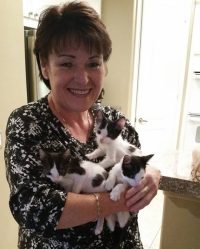 Now that snow has fallen upon us, we can safely say autumn is definitely starting to turn into winter. But here at VOKRA we’re never cold because we have so many cuddly kitties to bundle up with. This November, we’d like to celebrate our Volunteer of the Month, a champion cat-cuddler, Anne Salomon.
Now that snow has fallen upon us, we can safely say autumn is definitely starting to turn into winter. But here at VOKRA we’re never cold because we have so many cuddly kitties to bundle up with. This November, we’d like to celebrate our Volunteer of the Month, a champion cat-cuddler, Anne Salomon.
Anne has always been a cat lover, having grown up with a cat throughout her childhood. After she retired in 2008, she started volunteering with a shelter in Langley as their communications director and helped with fundraising. Taking a short break from that job, she quickly found herself volunteering with VOKRA, helping with trapping cats.
Anne came to realize how big the homeless cat situation is and wanted to help the best she could. She has now trapped and helped save several hundred cats and kittens! Some rescues that stand out to Anne are Little, Dude and their two siblings. These were day-old kitties found in an abandoned house under construction.
Trapping is hard work, but Anne finds it wonderful to follow all the cats’ journeys on Facebook. At the same time, she faces a tinge of jealousy as all she wants to do is take them all home!
“I’m honoured to be on the VOKRA trapping team,” said Anne. “I always know the whole organization is behind us and that we work towards a common goal, to combat the homelessness of cats in our area. I cherish the camaraderie and support amongst the volunteers at VOKRA. The work is very rewarding and addicting, but at the same time, sometimes heartbreaking. There are highs and lows and I’ve learned it’s not just the cats that need our help. We end up helping people as well.”
We’re incredibly grateful for all the help Anne has given – through her time, effort and loyalty – to help VOKRA and the kitties. We’re lucky to have her on our team and the cats and kittens are very lucky to have Anne on their side. Thank you Anne for helping us towards our mission to end cat overpopulation and homelessness.
Post written by Aurora C.
As a volunteer-driven non-profit, we clearly couldn’t do what we do without our extremely dedicated and hard working team of volunteers. THANK YOU!
If you’re interested in volunteering with us visit our website at vokra.ca/volunteer.
]]>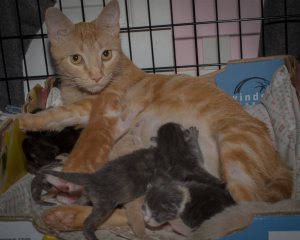 This beautiful girl is April and she’s the proud mama of 10 healthy kittens. Yes, 10 kittens! This is the first time in VOKRA history a mama has successful delivered 10 healthy babies.
This beautiful girl is April and she’s the proud mama of 10 healthy kittens. Yes, 10 kittens! This is the first time in VOKRA history a mama has successful delivered 10 healthy babies.
Each year during kitten season more than 900 kittens are born in our care. And if April’s litter is any indication, this season will be no different. As a volunteer-driven non-profit, we can’t support this many kittens without the help of people like you.
Kittens in our care have a chance at a happy, safe and healthy life. With so many kittens, April isn’t able to care for them all on her own. She simply doesn’t have enough milk to support this many babies and, if she would have given birth on the street, it’s certain some of them would not be alive today.
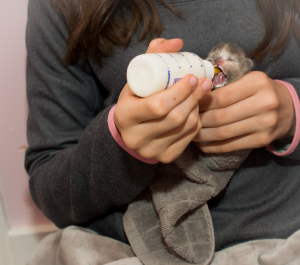 Thankfully we were able to rescue April in time and she gave birth in a safe space. Her foster mom Brenda is ensuring all the kittens get enough to eat through bottle feeding so everyone’s thriving.
Thankfully we were able to rescue April in time and she gave birth in a safe space. Her foster mom Brenda is ensuring all the kittens get enough to eat through bottle feeding so everyone’s thriving.
Between the cost of special kitten formula and supplements, nursing kits and medical care we anticipate the cost to support each of these kittens is more than $150. That adds up to more than $1,500 just for this litter alone.
Your support today will help us buy extra food and litter, and will also pay for veterinary care and medication.
Please donate today to help save kittens like April’s.
A special thank you to Laureen Stokes for taking the photos of April and her family!
]]>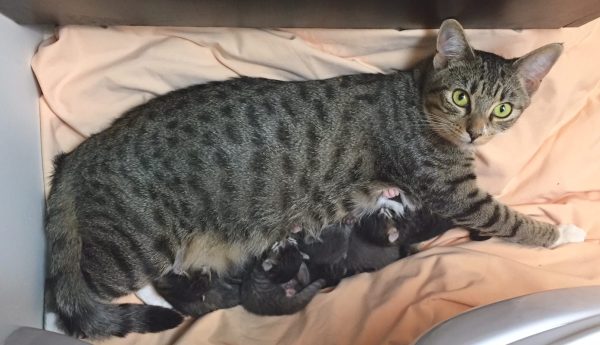
This is Cauliflower and she’s the proud mama of five kittens.
She was found upset and crying in the street not far from our Operations Centre. We’re not quite sure how she came to be on her own, but a neighbour told us this isn’t her first litter.
Unfortunately Cauliflower’s story is not uncommon. This year alone, more than 130 moms gave birth to more than 545 kittens while in our care. That’s a lot of kittens! And it doesn’t even take into account the little ones who’ve arrived without a mom.
The reality is only 25% of kittens who don’t receive human care survive. As a volunteer-driven non-profit, we wouldn’t be able to help all these moms and kittens without the support of people like you.
Kittens in our care have a chance at a happy, safe and healthy life. Once they’re old enough, Kale, Parsnip, Courgette, Broccoli and Cabbage will all be spayed/neutered and adopted into loving forever homes. And, like all the moms, Cauliflower will be spayed so she’ll never have to worry about getting pregnant again and she too will have her own forever home.
Your support today will help us pay for the cost of spaying/neutering, as well as for the food, litter and extra veterinary care all these moms and babies need.
This holiday season, please DONATE to help save families like Cauliflower’s.
And meet little Brussel Sprout, an honorary member of the veggie patch. He and his sister were found freezing cold in a shoebox when they were just a couple of days old. Despite our best efforts, we lost his sister and he was left alone in the world. But luckily for him, he went to live with foster mom Tania where he was bottle fed and received round-the-clock care. It just so happens Tania’s also fostering Cauliflower and her kittens. Cauliflower took one look at him and decided he needed to come join the veggie patch and that’s how he became Brussel Sprout!
P.S. – By becoming a monthly donor you can show your support for VOKRA all year long. Just $10 pays for one kitten to be vaccinated each month.
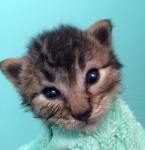
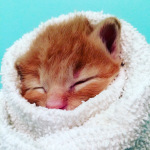
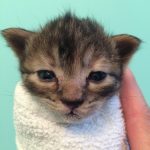

Kittens, kittens everywhere!
Kitten season may be the cutest time of the year, but it means a lot of extra costs and work for us here at VOKRA.
Each year during kitten season we care for more than 400 kittens, and this year is no exception. As a volunteer-driven non-profit, we can’t do this without the support of people like you.
Kittens in our care have a chance at a happy, safe and healthy life. Kittens like Samuel, Simon, Lily Mae and Ginger McGraw. These little orphans came to us when they were only a couple weeks old. We’ll never know what happened to their mom, but what we do know is they wouldn’t be alive today without our care.
When these kittens arrived they were so young they needed to be bottle fed every 2 – 3 hours. Between the cost of special kitten formula and supplements, nursing kits and medical care it costs more than $250 to raise each kitten. That adds up to more than $1,000 just for this litter alone.
Your support today will help us buy extra food and litter, and will also pay for veterinary care and medication.
Please donate today to help save kittens like Ginger and her brothers and sister.
]]>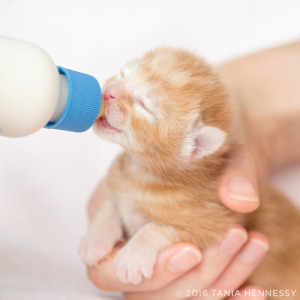 If you’ve ever wondered about VOKRA’s origins, you wouldn’t have too look far – it’s right there in our name, specifically in the O and the K, which stand for “Orphan Kitten”. Founded because of kittens that were orphaned and without moms, VOKRA began as a means to provide crucial care that would replicate the feeding and love a mom cat would normally provide.
If you’ve ever wondered about VOKRA’s origins, you wouldn’t have too look far – it’s right there in our name, specifically in the O and the K, which stand for “Orphan Kitten”. Founded because of kittens that were orphaned and without moms, VOKRA began as a means to provide crucial care that would replicate the feeding and love a mom cat would normally provide.
Though bottle feeding kittens may sound like it’s all purrs, cuddles and explosions of cute, considering that most litters reach upwards of five, it’s no small feat. Newborn kittens require constant tending to and must be fed every two hours. They have to be kept warm at all times through the use of blankets and heaters, they need to be burped and bathed, and you must stimulate their poop and pee. Basically you need to replace their mom in every way possible, short of becoming a cat yourself.
Many years ago, VOKRA founders Karen Duncan and Maria Soroski were volunteers at the SPCA when litters of kittens kept coming in without moms. They quickly learned how to bottle feed and fielded requests for their services up to twice a day during kitten season. If you’re picturing an actual orphanage filled with rows of cat beds and endless litters of kittens, you wouldn’t be far off. At times their own beds were piled high with kennels full of kittens requiring 24-hour care. Eventually, Karen and Maria branched off on their own and realized the reason for all the motherless kittens was that no one had figured out how to trap the feral moms. Once they began trapping them, the need for bottle feeding was greatly reduced.
While keeping kittens with their mom is always the preference, bottle feeding is at times a necessity. Sometimes it may only be for a short period, temporarily feeding them until their mom is located or merely helping a mom cat with her extra large litter. Other times we may be able to use surrogate moms instead, adding orphaned kittens to another mom’s litter. We trap feral moms whenever possible, using the scent of her kittens’ urine or fur to lure her in. But in cases where the mom is never found or has passed away, bottle feeding is the only hope of the kittens’ survival.
Receiving an average of 10 litters a year that require full-time bottle feeding, we have a handful of dedicated volunteers who provide constant care and attention to ensure these little ones survive. Around the clock care is necessary and some volunteers even take their tiny wards to work. In the past Ellen Keiser, a teacher, took her bottle fed babies to school and fed them during recess and lunch as her class looked on for some firsthand lessons in cat rescue. At times, volunteers share the duties between them, “babysitting” if one of them needs a break.
Even with the best possible care, survival rates are a bit lower for bottle fed kittens. They’re more prone to illness and not all of them make it. To be a bottle feeder volunteer requires not only time, patience, flexibility and the ability to do without sleep, but also the strength to handle the potential for heartbreak. Says Ellen, “You need to prepare yourself for the loss, but also for the celebration that so many do make it due to your efforts.” Last year, foster mom Tania Hennessy cared for more bottle feeders than she ever had before and says she becomes especially attached to them. For her, watching them grow up and find their forever homes is worth the undertaking.
Bottle fed kittens sleep a lot and after two weeks you can begin to train them to use their litter boxes. Eventually you’ll find small puddles of poop, which to a seasoned cat rescuer like Karen is “quite exciting”. As the kittens grow, they become among the sweetest and sociable of cats since growing up among humans is all they’ve known. In fact, they consider their bottle feeding human to be their “real” mom. Says Tania, “My favorite part of caring for bottle feeders is the day when their eyes open and they finally look back at you for the first time. Paired with the happy purrs of a full belly at 3 a.m., it’s heart melting!” Seeing bottle fed babies transform into active and healthy kittens is truly a reward like no other.
Written by Ellen R.
As a 100% volunteer-driven non-profit, we clearly couldn’t do what we do without our extremely dedicated and hard working team of volunteers. We’re currently actively looking for cat care and reception volunteers. If you’re interested in volunteering with us visit our website at vokra.ca/volunteer.
]]>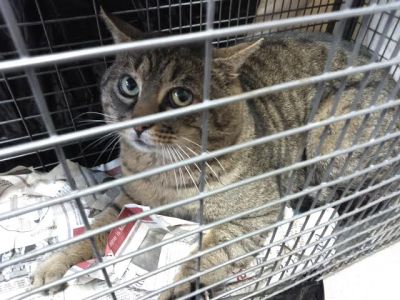
It’s hard to keep track of all the acronyms that exist these days, but in the cat rescue world TNR is a big one. TNR stands for Trap-Neuter-Return and describes the process of trapping feral cats, spaying or neutering them, and then returning them to the location they came from. According to VOKRA co-founder Maria Soroski, it’s the most effective and humane way to help control the feral cat population.
When VOKRA formed back in 2000, Maria had no idea what a feral cat was, which is hard to believe for someone who is such a strong advocate for Vancouver street cats. She, along with fellow co-founder Karen Duncan, began by bottle feeding kittens that had been brought into the SPCA before branching off on their own to create VOKRA.
“I had no idea where the kittens were coming from,” says Maria, who wondered what happened to the kittens’ moms. “I assumed they were from owned cats or that they’d been orphaned.” However, as kittens kept arriving from the same addresses, Maria and Karen started to do a little sleuthing. They soon discovered a whole world of feral cats. The mother cats hadn’t been brought in because they were wild – no one could touch them, let alone pick them up and transport them into care.
Maria discovered entire colonies, some with upwards of 50 cats. They were all the moms, dads, aunts, uncles and cousins of all the bottle-fed kittens that had come in. Thanks to the guidance of local rescuers and the resources of Alley Cat Allies, Maria quickly learned to trap and hasn’t looked back since.
VOKRA’s volunteer trappers, spearheaded by Maria, spent eight years trapping seven days a week in Vancouver and Burnaby. It’s estimated there were more than 8000 – 9000 free roaming cats in Vancouver before VOKRA came along. The number of feral cats is now down to less than 300 with the remaining colonies under control. Some of the colonies now consist solely of senior citizen cats, who pass on humanely after living a life on their own terms.
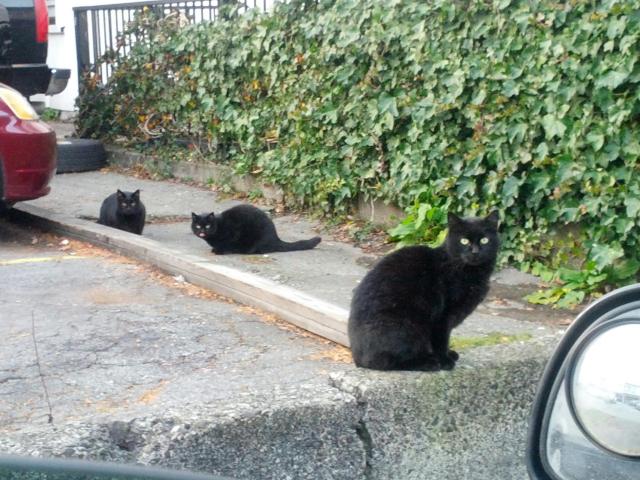
It’s estimated there were more than 8000 – 9000 free roaming cats in Vancouver before VOKRA came along, but now that number is down to less than 300 with the remaining colonies under control.
For cats that we can’t return to their original site, we try and find them another home – specifically a barn or hobby farm. Janet, who coordinates the barn cat placement program, says “It’s an alternative option for feral cats that are unable to be returned to their original location for various reasons.” The barns are located throughout the Lower Mainland, from Abbotsford to Squamish, and Janet often drives the cats to their new homes herself. Potential placements are interviewed in advance and the cats are guaranteed fresh food and water daily, along with a safe shelter area. In their new “jobs” as rodent control technicians they have a better life than they would out on the streets.
If the cats are young enough or semi-tame, then we’ll try to socialize them so we can adopt them to forever homes. “We’re not scared of hissy babies,” says Maria. Armed with gloves, towels, treats, and a whole lot of patient love, VOKRA volunteers socialize kittens in their homes. VOKRA runs workshops and provides coaching to these special families. Fosters tell us this is an immensely rewarding part of being with VOKRA. To watch a kitten or adult cat transform from an untrusting and extremely frightened creature to one that seeks out your affection with headbutts to your hand, and who purrs at the very sound of your voice, is a truly amazing experience.
We respond to as many calls we can and trap feral cats, tame moms protecting their kittens and tame adults that are too afraid to trust humans just yet. Sometimes this involves all-night efforts and sometimes it involves walking into an abandoned house in protective gear so as not to be eaten alive by the swarms of fleas. Whatever it takes – the fate of all cats is important to us and those who were never given the chance to live a safe, indoor life deserve the best that we can give them.
Join us in celebrating National Feral Cat Day October 16.
As a non-profit association we rely on the contributions of people like you. If you’d like to support our TNR program click here.
Post written by Ellen R.
]]>Tracey started her volunteering with VOKRA in 2013, but previously volunteered at Pet Smart, caring for VOKRA kitties when we had our adoption centre there. What she loves about volunteering with kitties is being able to spend time with them, to make small and large differences in their lives. Tracey loves how the kitties are appreciative with her presence, and she adores sharing her love, trust, and laughs with each and every adorable kitty. She has encountered countless kitties, but cannot choose a favourite – who can?!
She adopted her own VOKRA kitty, Bandit, in April 2005, and fell in love with her straight away. When Bandit’s feline companion died, Tracey went on the hunt to adopt another to keep Bandit company in 2010, which prompted her to volunteer with Pet Smart and VOKRA.
Our volunteers are also appreciative of Tracey and all her hard work. After all, it is only from her gallery uploads that our deserving kitties and cats can be viewed and adopted into loving arms! VOKRA Board member Valerie says:
Tracey is a behind the scenes VOKRA volunteer who uploads all our kitty pictures, and there are many to do especially in kitten season! She is polite, friendly, involved and helps fosters with their photos and other questions that they ask her. Tracey is a very important and valued part of VOKRA, quietly doing a lot of work and helping to get our kitties adopted. A really lovely person.
Once again, we’d like to give our thanks to Tracey. As a behind-the-scenes volunteer, she does not deserve any less recognition than any of our other volunteers. She plays such an important role our organization and the way things are run, so a huge thanks to you, Tracey! Keep up the outstanding work!
If you would like to get involved with our wonderful VOKRA team, please visit our website for more information, and apply to volunteer today!
Post written by Aurora C
]]>Felix and his family are no strangers to the work VOKRA does as they adopted two cats through us last year and have given them a wonderful home.
And now, they are helping other kitties too. Kitties like Sudermann.
Our fantastic volunteer, Valerie, told Felix Sudermann’s story and about how lucky this cat is to be alive. She let him know that the money he donated will help with Sudermann’s vet bills so he can get better and find a great forever home, just like Felix’s cats now have.
We loved meeting Felix and appreciate his donation so much. And we think Felix was pretty happy with the visit too. He was so excited, he said that when he gets bigger, he wants to volunteer for VOKRA. We look very much forward to that, Felix. You’re already a great part of our team.
Thanks for supporting VOKRA, Felix, and for being a Compassionate Kid!
]]>